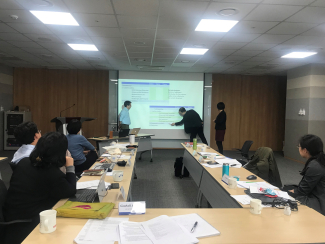North-East Asia Low Carbon City Platform (NEA-LCCP) Comparative Study: Final Review Meeting

North-East Asia Low Carbon City Platform (NEA-LCCP), launched in 2015 under the NEASPEC, aims to support improving low carbon city plans and programmes and reviewing government policies.
In line with this goal, the NEASPEC Secretariat has conducted a research project in collaboration with Innovative Green Development Proramme (iGDP), Institute for Global Environmental Studies (IGES) and Korea Environment Institute (KEI) to generate a comprehensive and systemic overview of national approaches and the status of low carbon development specifically in China, Japan, and Republic of Korea. The study also aims to identify good practices from cities and on specific sector for sharing information and promoting cooperation.
Bringing all project partners together, the meeting had a final review on the synthesized draft report and discussed joint recommendations and dissemination of the study outputs.
- Opening and welcome remarks by UNESCAP ENEA Office
- Recap of NEA-LCCP objectives and how the comparative study will be used in the coming months
Presentation by iGDP and followed by Q&A and discussion
- Briefly describe highlights of country report
- Focus on low carbon city challenges and prospects
- Thoughts on relevance of low-carbon city policy in NEA region
- Thoughts on applicability of case studies in NEA region
Presentation by IGES and followed by Q&A and discussion
- Briefly describe highlights of country report (very brief)
- Focus on low carbon city challenges and prospects
Beyond participation in the national certification schemes such as the Eco-city (or perhaps as part of participation in these schemes), what policies or approaches are commonly used by Japanese cities take to promote low carbon development (not thinking just the case studies, but widespread usage)
Presentation by KEI and followed by Q&A and discussion
- Briefly describe highlights of country report
- Focus on KR low-carbon city policy challenges and prospects
- More detail on Korea’s policy of encouraging cities to voluntarily develop climate action plans. What further information is available on this?
- What policies or approaches are commonly used by Korean cities take to promote low carbon development (using a command-and-control/voluntary/market-economic policy framework)
- What kind of support / capacity building does the Korean Environment Corporation (or other agencies) provide to local governments in developing low carbon cities?
Presentation by iGDP
iGDP leads discussion on how to use the case studies / talk about them / promote them
Discussion led by iGDP
- Lines of Analysis
- Conclusions and Recommendations
 Back to Meetings
Back to Meetings